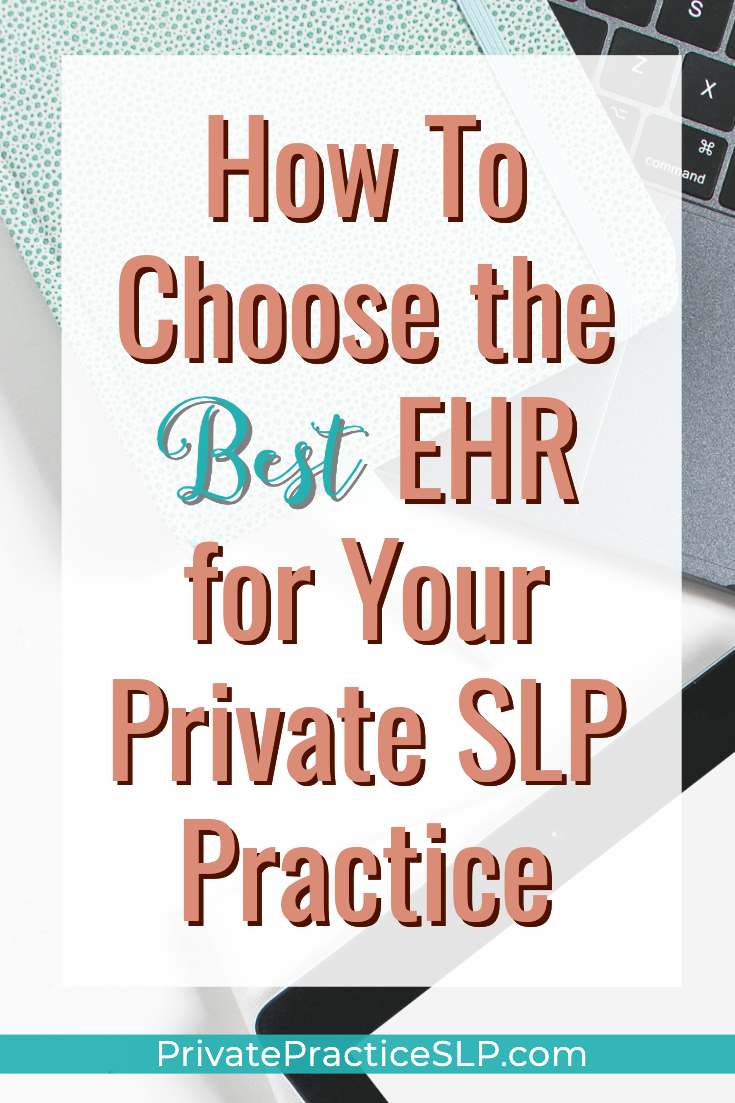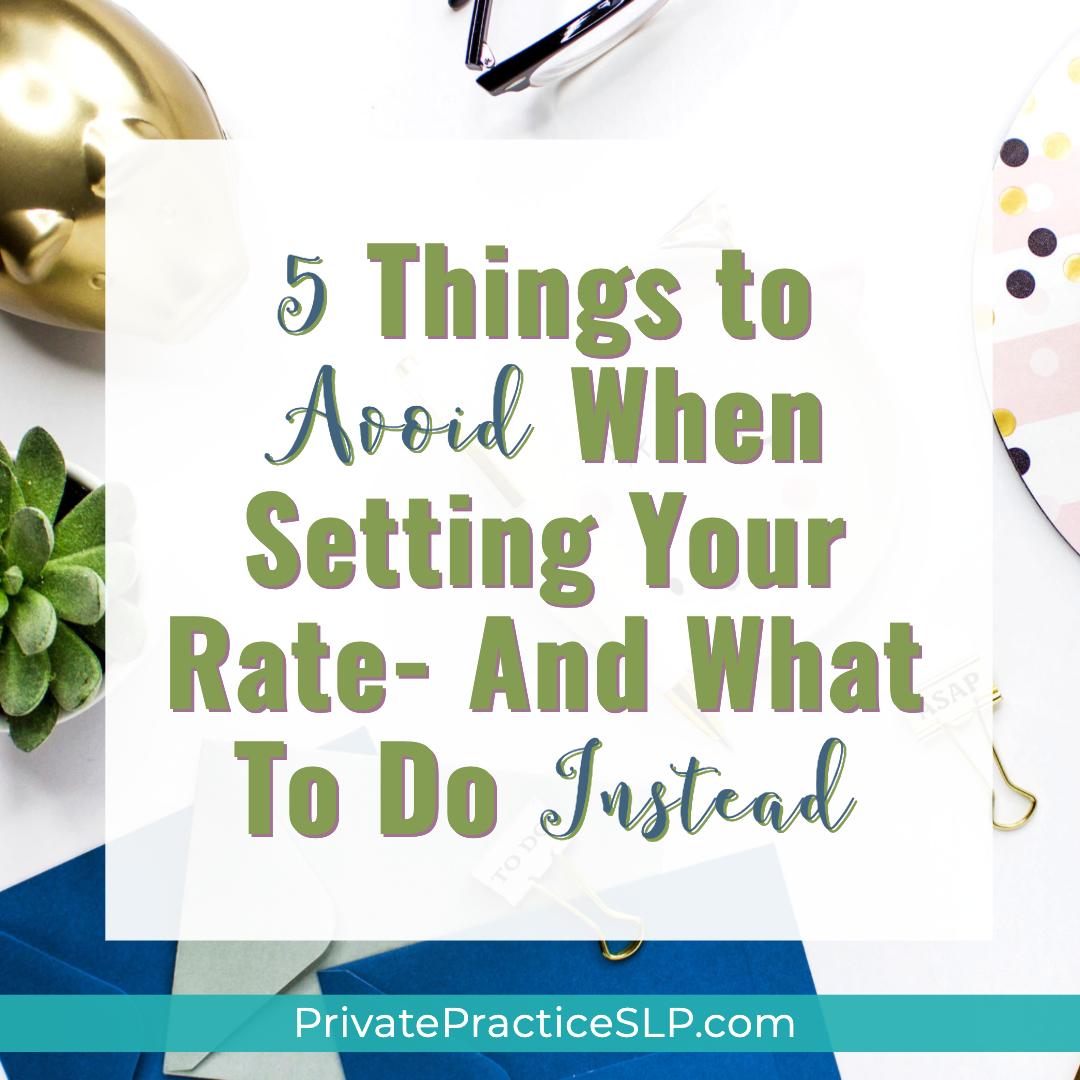How to Choose the Best EHR for Your SLP Practice
Updated 07/22/2022
As an SLP in private practice, you can choose to use paper records or electronic records. If you have just a few private clients and only accept private pay (no insurance), then paper records can work just fine. However, if you accept insurance or have more than a few clients, you are pretty much going to need an EHR. Not only does it save you file cabinet space and trees, many insurances require or strongly advise electronic claim submission, and having an EHR makes things as simple as dealing with insurance can get.
Not sure what EHR means? Like most parts of our profession, electronic documentation and billing comes with a whole host of acronyms. Here's a quick breakdown of the most common acronyms:
EMR: Electronic Medical Record. Digital versions of paper charts with patient information, notes, evaluations, and insurance info.
EHR: Electronic Health Record; in the past, was considered more comprehensive than an EMR and allows more functionality. Used interchangeably with EMR nowadays.
Claim: the invoice or bill you submit to an insurance company. Requires info like NPI of treating clinician, ICD-10 code/s, CPT code/s, and patient insurance info
Clearinghouse: An intermediary between you and the insurance company. They check claims for accuracy and forward claim info to insurance companies ("claims scrubbing"). Required by all insurance companies, and part of all EMRs.
EOB: Explanation of Benefits. A form that explains why an insurance company accepts or rejects a claim. Sent to patient and clinician (will look different for each)
EFT: Electronic Funds Transfer. Direct deposit from insurance.
ERA: Electronic Remittance Advice. Info from the insurance company about why a claim was or was not accepted. Electronic form of an EOB.
PHR: Personal Health Record. The patient portion of health records; what is made accessible from a patient portal. This is what you get when you request your medical records from your doctor's office
Superbill: an itemized form that shows what treatment you provided. Can submit as claim to insurance companies or give to patient to submit.
Choosing an EHR is highly dependent on your specific practices' needs. Are you a solo practitioner or do you have employees? Will you need multiple specialties (PT and OT along with SLPs) to be adding notes and forms?
Some questions to keep in mind while searching for the perfect EHR fit:
Fees:
Does the EHR charge by the clinician or by the client? Are there fees for office staff (non-billing staff) who will be using it?
What does the monthly fee include? Are there extra fees for a client portal, appointment reminders, or importing or exporting data?
Does this EHR integrate with a specific credit card company? If so, what are the credit card fees?
Billing:
Is billing integrated or through a separate system?
Is it easy to create invoices and superbills in the system?
What are the claim fees?
Are ERA's available? Is there a fee for them?
Support:
When is the support available and what types are offered (phone, chat, email, just a DIY forum?) Can I talk to an actual human if I need to?
Is there a fee for "concierge" support (after business hours, via phone, etc)?
Customization:
Can I customize the CPT and ICD-10 codes or add a frequently-used code list? Are SLP-specific codes available or will I need to add them in?
Can I customize the paperwork/documents within the system or do I have to scan everything in?
Can I add my logo to the paperwork so my documents look professional?
Client Communication:
Does this EHR support paperless intakes?
Is there a Client Portal or secure messaging available so I can communicate with clients?
Once you are armed with those questions, you can check out the EHRs that the internet has to offer. You will have to do a demo with them to truly see their features. Most offer a free 30 day trial.
Some of the most popular EHR's among SLPs are:
I trialed many EHR's while searching for one that fit my practice. I spent hours adding in client info and seeing how the software worked. After a few months of trial (and error), I found my "Goldilocks" EHR- the best fit for me. It was Simple Practice. Here's why I love it:
the Client Portal is built in (no extra fee) and allows completely paperless intakes through interactive forms
You can easily create superbills and invoices, and email them to clients right from their chart
Billing is simple (they have their own clearinghouse so you can bill insurance right from your account for 25 cents per claim. You can also create CMS 1500 forms and bill outside of Simple Practice if you have another clearinghouse that you prefer)
It is integrated with Stripe so clients can pay invoices securely right from that client portal for just the cost of Stripe fees (2.95% + 30 cents)- but you don’t have to integrate if you'd rather not pay the Stripe fee. If you choose a different credit card processor, you will need to MANUALLY add any payments or credits into each client’s account to keep track of them.
If you are interested in trialing Simple Practice, use my referral link to start your free 30 day trial. If you end up loving it too and signing up for a paid plan after your trial, you'll get 1 month free after your trial period!
If you have any questions about choosing an EHR or starting a private practice, comment below!
If you want a chart that compares 20 different EHRs on the basis of fees, templates, credit card processing, and mobile use, sign up for my Freebie Library (below this post if you’re on mobile, or over to the right if you’re on a desktop).
Want an entire video module on how to choose an EHR, with in-depth comparisons? Check out my Private Practice Foundations course. It has an entire section on choosing an EHR, along with the handy chart.







